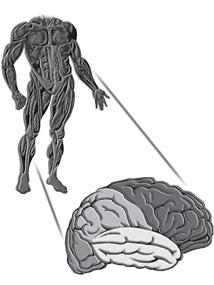Your body is a survival organism. It reacts to forces in the environment that might cause sickness or death – anything that would get in the way of its survival. Reducing calories is understood by your body as an assault meant to decrease its ability to survive. Taking away fattening foods causes the body to go into a mode where it will hoard and tend to store fattening food eaten as fat.

To explain this in a way that is more understandable, become familiar with two concepts that will be used repeatedly. These concepts may seem a little strange at first until you get used to them. In your mind try to redefine the concepts of “PERSON” and “BODY” as two new ideas:
Those are just a few examples of the systems and processes in everyone’s body that are continuously occurring.  None of these systems or processes require conscious thought to function.
There are other automatic processes related to losing weight that happen to us as well. Being overweight is a bodily process that you can only reverse with your behavior, and it is your behavior that you control with conscious thought. Conscious thought alone will not reduce weight; you can’t think bodyfat away. Unconscious processes in the body are at work while you make the conscious thought to engage in the behavior of eating.
None of these systems or processes require conscious thought to function.
There are other automatic processes related to losing weight that happen to us as well. Being overweight is a bodily process that you can only reverse with your behavior, and it is your behavior that you control with conscious thought. Conscious thought alone will not reduce weight; you can’t think bodyfat away. Unconscious processes in the body are at work while you make the conscious thought to engage in the behavior of eating.
Most diet plans focus only on the person – the conscious part of dieting that controls our decision making and therefore behavior. Think of the body as having a mind of its own because in many ways it does. The body behaves instinctively – our minds do not control our hearts beating and other processes mentioned above. The person has no control over these bodily processes.
This “mind of its own” that the body has will be hereafter referred to as the body – so the body emphasized this way means the body’s responses to the environment and natural reactions that we cannot directly control with our minds. When you see the person in emphasis it means the mind – decisions and behaviors that we can directly control.
Put another way, the body acts a certain way during dieting that is outside of our mental ability to control – as if it had a mind of its own. Expand your thinking to see that the body is “thinking” (has its own reactions) during the dieting process that is separate from our conscious thoughts. In fact, often the body has vastly different or even opposite reactions to our conscious thoughts. Realize that you do not lose weight in your brain; you lose weight in your body and because dieting is a somewhat unnatural act, the body has a set of natural defenses against the act of dieting.
To repeat, dieting is unnatural and the human body naturally “defends” against it. When you lose weight the body “thinks” there’s an emergency and hoards what you’ve eaten by slowing metabolism thereby burning less fuel. Take for example a person that is overweight and starts out on a healthy, whole single ingredient foods diet. This person eats healthy food, follows the diet plan in this book and feels satisfied in their mind. They are not hungry while on this diet and you won’t be either. However the body is really starving for fattening foods but the person does not know it. Their mind (the person) cannot feel what the body is geared to expect – physiological “expectation” is the body’s way of “thinking.” The body became used to years of fattening foods before the person dieted – the body “expects” fattening food to show up because it takes time to get this “mind” of the body to react the way we want it to. It can take years to “gear up” for the unnatural process of weight loss and maintaining a slim figure because it took years to get the body used to expecting fattening food.
The body reacts much differently than the person does when a fattening food diet is replaced with thin foods. Inside the mind (again, this person concept) when you’ve dieted before you’ve probably struggled with temptation, self control, feelings of deprivation, oversized appetite, trying to maintain will power and even self pity. The body has no concept of these emotions. To repeat, the body only has survival intelligence and an expectation for the fattening foods (because the overweight person has been eating fattening foods for years). The body “thinks” these foods are what it needs to survive, and survival is the main concern of the body. The body doesn’t care if you lose weight or if you look good in a bathing suit. The body is not concerned with your emotions or what you want on a minute by minute basis. Your brain is. The body only cares about what is going to occur to it long term (survival). Humans have survived thousands of years not because our ancestors were able to successfully lose weight and be thin. The human organism was not designed to gain and lose large amounts of weight.
Dieting and looking thin has little meaning across generations and in fact dieting contradicts the goals of survival. Most of our ancestors were thin their whole lives because the abundance of available processed foods simply didn’t exist. Today it does. From childhood, many of us have “taught” this “mind of the body” that abundant, processed foods equal survival. The body doesn’t know hunger. Just as the body doesn’t understand any (all) of your emotions, it also does not know or experience the feeling of hunger. You experience hunger in the moment and in your mind (the person). The body reacts to your eating behaviors over a period of many days.
If you accidentally miss several meals for whatever reason, is it okay to eat fattening food because you haven’t eaten in hours? Won’t things “balance out” because you haven’t eaten in so long? No! Because dieting is an unnatural act, losing weight or the process of getting the body into a state where fat is being burned takes time. Again, the body’s “goals” are opposite from the survival threatening act of dieting.
For most of us, the person (mind) is pre-occupied with its current state and how it feels in the short term. The person must struggle with long term “goal” behaviors beneficial to the body but that require consistency or the ability to perform them over and over. “I feel tired,” or “I’m hungry,” or “I have a headache,” and many other emotions are minute to minute concerns of the person. The body doesn’t recognize “hungry” or “headache” or any short-term concerns. It only “thinks” in terms of processes that are long term in nature. Successful  dieting is permanent interruption to a long term process of eating fattening food that breaks the expectations of the body. The body recognizes this break in the flow of fattening food and responds to it by hoarding any fattening food consumed during dieting.
dieting is permanent interruption to a long term process of eating fattening food that breaks the expectations of the body. The body recognizes this break in the flow of fattening food and responds to it by hoarding any fattening food consumed during dieting.
This point is important. When fattening foods are taken away from the body, even an overweight body, it is like light taken away from a plant. When light is taken away from a healthy plant, any light from anywhere causes the plant to bend toward it. Such is the case with your body: any fattening food eaten is hoarded and stored – much more aggressively than before you dieted. Now that fattening food has been taken away, the body tries to hang on to it for dear life because it literally “thinks” that its dear life is threatened. This is the reason that cheating even once stops weight loss for up to two full weeks. You cheat and eat fattening food, and the body hoards it and stores it, reversing the process of weight loss at the same time. You should also note that cheating during a diet can create some of the most stubborn fat to lose later.